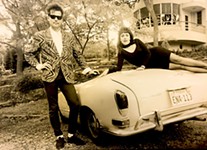James Carlos Blake
By Jesse Sublett, Fri., Nov. 5, 1999

James Carlos Blake writes novels about violent men living in violent times. His stories take the reader into a whirlwind of war, revolution, crime, and dark mayhem in an environment where civilization is either absent or fighting a losing battle with the wilderness and the men who thrive in such places. The violence is sudden and inevitable and unredeeming. Think of Sam Peckinpah movies. Think of a night in the Everglades (the setting of Red Grass River) during alligator mating season. In the Rogue Blood, quite likely the most violent book in American literature, follows the escapades of two damned and defiant brothers on a blood- and gore-strewn trail from Florida to Texas and Mexico during the U.S. war with Mexico in the 1840s. One joins Zachary Taylor's army and the other joins the infamous Glanton gang of scalp hunters. The book uses some of the same source material for inspiration as Cormac McCarthy's Blood Meridian, and also echoes the prose style of the latter with its Biblical cadences and its vision of a world as seen through blood-colored glasses. In the opinion of many readers, however, Blake's book is a unique creation that stands on its own merits and surpasses McCarthy's in both its readability and sheer body count. A Kirkus review cataloged the violence this way: "People are shot, clubbed, knifed, eviscerated, castrated, decapitated, impaled, flayed alive, hanged, scalped, dismembered, blown up, and immolated."
"I am the fourth generation of men in my family to be born in Mexico, all of us descendants of an American who himself was sired by an English pirate," Blake explains in his introduction to Borderlands, his recent collection of short fiction. Blake's childhood and family heritage is rife with swashbuckling and the crosscurrents and conflict of mixed blood and clashing cultures of the borderlands where he grew up. No wonder he writes such wild, adventurous literature. The pirate was shot by a firing squad in Veracruz. The pirate's grandson was a patrón who was knifed to death on the church steps by a disgruntled employee. Blake himself is a product of the Texas/Mexico borderlands and the swamps of south Florida, where he earned money in high school catching and selling poisonous snakes. "The big benefit of my itinerant boyhood
A page of quotations in Borderlands ends with Heraclitus: "Character is fate." Those three words are the underpinning of all Blake's work. "It's been a theme in everything I've written," Blake says. "Men and women fully aware of who they are, in a world where few seem to know themselves at all. Facing the truth about ourselves calls for the greatest kind of courage, because we all suspect such truth will not be very flattering or very gentle."
James Carlos Blake will give a reading on Sunday, November 7 at 11:15am in the Auditorium in the Capitol Extension.








